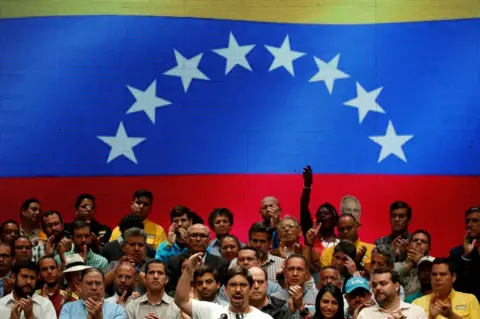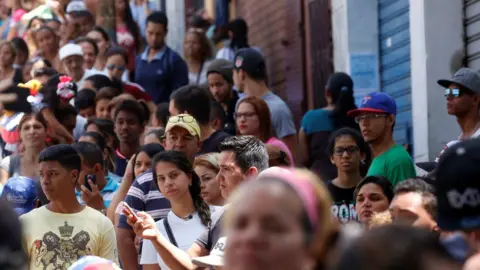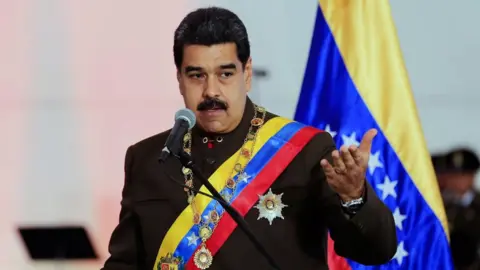Venezuela opposition calls for general strike over Maduro plans
 Reuters
ReutersVenezuela's opposition has called for a 24-hour strike on Thursday in protest against President Nicolás Maduro's plans for a new constituent assembly.
In a statement, leaders said 7.6 million people had taken part in Sunday's opposition-organised referendum on the plans.
They also announced they would name new Supreme Court judges.
The assembly, made up of citizens, would have power to scrap the National Assembly and rewrite the constitution.
Opposition parties control the National Assembly and are calling for fresh elections before Mr Maduro's term expires in early 2019.
"It is time for zero hour," said opposition leader Freddy Guevara, speaking on behalf of the Democratic Unity coalition (MUD).
"We call on the whole country this Thursday to join massively and peacefully a national civic strike of 24 hours as a mechanism of pressure and preparation for the definitive escalation which will be next week."
He added that on Wednesday the opposition would take the first steps to set up a national unity government and that on Friday it would appoint new judges.
Correspondents say such proposals raise the possibility of a parallel state structure.
Shortly before the opposition press conference, Venezuelan Foreign Minister Samuel Moncada criticised Sunday's vote.
"It was a grotesque experiment of media manipulation. It has no legal validity," he said.
"No-one knows, or will ever know, how many people have taken part," he added.
The government said the referendum was riddled with fraud and that people were able to vote many times at different polling stations.
On Saturday, President Maduro dismissed the vote as "meaningless".
Academics who monitored the poll said that nearly all those who voted rejected the new assembly proposed by Mr Maduro and backed a call for elections before 2019.
 Reuters
ReutersMr Guevara said the Venezuelan people had given a mandate, rejecting "the fraudulent proposal of Nicolás Maduro".
"The regime must understand that we won't allow the destruction of Venezuela to happen," he said.
"The government must pull out its proposal of constitutional fraud."
President Maduro's plan will see a vote on 30 July for the new constituent assembly.
Its 545 members will have the power to dissolve state institutions, including the National Assembly.
Mr Maduro argues that the assembly is the only way to help Venezuela out of its economic and political crisis. He says the opposition is trying to overthrow the government.

Why is Venezuela in crisis?
 EPA
EPA- Nearly 100 people have been killed in clashes stemming from the political conflict
- The deep economic crisis is made worse by the falling price of oil, which accounts for about 95% of Venezuela's export revenues and was used to finance some of the government's social programmes. Forced to make cuts, President Nicolás Maduro has seen his support fall among core backers
- Basic necessities, such as medicine and food, are in short supply
- The opposition accuses Mr Maduro of mismanaging the economy and eroding democratic institutions
- In March, the Supreme Court decided it would take over the National Assembly. The decision was reversed, but Mr Maduro was accused by opponents of trying to stage a coup. That sparked almost daily protests calling for his resignation
